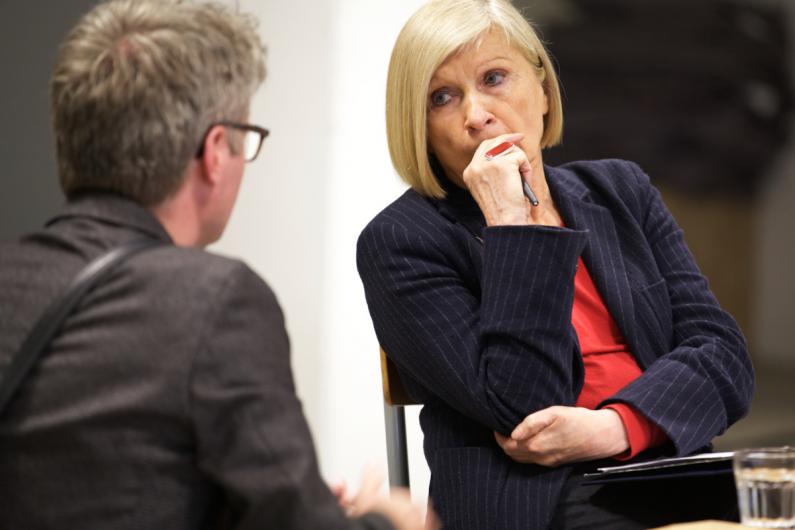With Didier Eribon and Chantal Mouffe. Hosted by Florian Malzacher
Gesellschaftsspiele: The Art of Assembly VII. as part of Wiener Festwochen
AGONISTIC GATHERINGS
While social movements often alter reality by implementing more radical models of democracy, within the arts theatre in particular has become a democratic arena of collective imagination. It is a forum in which society is played out, performed, re-imagined, or reinvented. But after months of a state of emergency in which any form of physical interaction has become precarious, what sort of future do assemblies and gatherings actually have? The Art of Assembly series brings together protagonists from the arts, politics and theory to speculate on the future of assemblies. In this exceptional edition, philosopher and sociologist Didier Eribon and political scientist Chantal Mouffe are joined by dramaturge Florian Malzacher to discuss how much agonism social movements are in fact able to withstand. Even if the movements of recent years have often been laboratories of non-hierarchical structures and consensus models, Chantal Mouffe stresses the necessity of dissent and agonistic pluralism. Didier Eribon for his part reflects on the conditions and limitations of social mobilisation and insists on the necessary diversity of movements like the gilets jaunes or the anti-racism protests.
About The Art of Assembly. Lectures, discussions, online platform
Whether in Tunis, Cairo, Madrid, or Lisbon, in Athens, New York, London, or Istanbul, in post-Fukushima Tokyo, in the midst of Niemeyer’s iconic parliamentary architecture in Brasilia, under the umbrellas of Hong Kong, or on the streets of Minneapolis: social and political movements of recent years have often been characterised by their search for alternative forms of gathering, of arguing and making decisions, of negotiating community and society. The potential of these assemblies lies in more than just the demands they put forward; many of them change reality merely by practicing radical models of democracy.
The arts have also shown a renewed interest in concepts of gathering and creating public spheres in which society is not only mirrored but constantly tried out, performed, tested, reimagined, or even reinvented. There are court hearings on artistic freedom, religion, and censorship; tribunals on exploitation and violence; summits on climate change or cultural policy; parliaments allowing those who are usually silenced to speak... Theatre in particular has become a stage for assemblies on the fine line between art and reality, a democratic arena of radical imagination.
But what is the future this concept of gathering has ahead of it after months in a state of emergency that has thrown pretty much all areas of social life out of step? Gesellschaftsspiele: The Art of Assembly brings together protagonists from various fields of art, politics and theory to speculate on the future of assembly in a time of experiencing that nothing is certain – a time in which every form of physical togetherness has become precarious.
Florian Malzacher is a curator, dramaturg and writer. 2013-2017 he was artistic director of Impulse Theater Festival (Cologne, Dusseldorf and Mulheim/Ruhr), and 2006–2012 co-programmer of the multidisciplinary arts festival steirischer herbst (Graz). He (co-)curated e.g. the 4th and 5th International Summer Academy (Mousonturm Frankfurt, 2002 and 2004), “Dictionary of War” (2006/07), “Truth is concrete” (Graz, 2012), “Artist Organisations International” (HAU Berlin, 2015), “Appropriations” (Ethnological Museum Berlin, 2014), “Sense of Possibility” on the occasion of the 100th anniversary of the revolution (St. Petersburg, 2017), “Training for the Future” (Ruhrtriennale 2018/19 with Jonas Staal), “After Supervising the Machinery” (2020). As a dramaturge he worked with artists like Rimini Protokoll (DE), Lola Arias (ARG), Mariano Pensotti (ARG), and Nature Theater of Oklahoma (USA). Florian Malzacher has edited and written numerous essays and books on theatre and performance and on the relationship between art and politics. His latest publications include Gesellschaftsspiele. Politisches Theater heute im Alexander Verlag Berlin. florianmalzacher.tumblr.com
The Art of Assembly is based on
Florian Malzacher. Gesellschaftsspiele. Politisches Theater heute. Berlin: Alexander Verlag, 2020.
Pressestimmen
"It matters that as bodies we arrive together in public, that we are assembling in public; we are coming together as bodies in alliance in the street and in the square. […] So this is a politics of the public body, the requirements of the body, its movement and voice. […] We sit and stand and move and speak, as we can, as the popular will, the one that electoral democracy has forgotten and abandoned. But we are here, and remain here, enacting the phrase, “we the people.”"
Judith Butler, Occupy Wall Street, 2011
Credits
With Oliver Marchart, Chantal Mouffe, Sibylle Peters, Julia Ramírez-Blanco, Milo Rau, Oliver Ressler, Dana Yahalomi / Public Movement and others Guests on September 16th Didier Eribon and Chantal Mouffe Curated by Florian Malzacher
A production by brut – Koproduktionshaus Wien GmbH
In cooperation with Münchner Kammerspiele and Wiener Festwochen
Dates & Tickets
September 2021
€ 7 / Online Livestream here on brut-wien.at
Halle G at Museumsquartier
Museumsplatz 1, 1070 Vienna
Event recommendations
Florian Malzacher
Gesellschaftsspiele: The Art of Assembly VI. ASSEMBLING MORE THAN HUMANS
With Radha D‘Souza & Sibylle Peters. Hosted by Florian Malzacher
brut all over Vienna
brut nordwest
accessible
Nordwestbahnstraße 8-10, 1200 Vienna
Subway: U1, U2 (Praterstern), U4 (Friedensbrücke), U6 (Dresdnerstraße) Tram: 5 (Nordwestbahnstraße) Bus: 5A (Wasnergasse)
accessible
studio brut
not accessible
Zieglergasse 25, 1070 Wien
Subway: U3 (Zieglergasse), Tram: 49 (Westbahnstraße / Zieglergasse)
not accessible
Bears in the Park Art Place
not accessible
Eyzinggasse 12, 1110 Vienna
U-Bahn: U3 (Gasometer) Bus: 72A (Gasometer), 76A, 76B (Simoningplatz)
not accessible
WUK performing arts
barrierefrei
Währinger Straße 59, 1090 Vienna
Subway: U6 (Währinger Straße / Volksoper), Tram: 40, 41, 42 (Währinger Straße / Volksoper), 5, 33 (Spitalgasse), 37, 38, 40, 41, 42 (Spitalgasse / Währinger Straße)
Der Betrieb
accessible
Vogelweidplatz 13, 1150 Wien
Subway: U6 (Burggasse-Stadthalle) / Bus: 48A (Moeringgasse) / Tram: 9 (Camillo Sitte Gasse)







